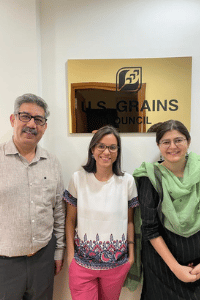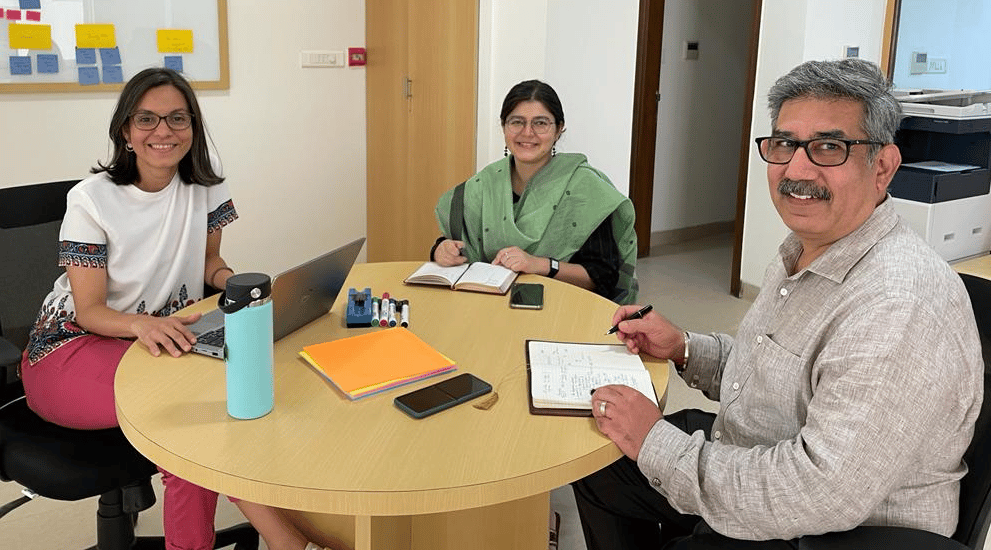After nearly four years of work, the U.S. Grains Council’s (USGC’s) staff and representatives in India are in the process of moving into a newly-established physical office in central New Delhi – the first new outpost for the organization since 2010.
The Council has worked in South Asia for decades, first with the local livestock feed industry and later to advocate for ethanol imports. In 2018, the organization’s leadership decided to carve out a separate regional office focused on growing this demand and began the process that culminated in the move-in this month.
 USGC South Asia Regional Director Alejandra Danielson Castillo has been in Singapore for three years working toward this goal before relocating with her family this month to Delhi, joining Amit Sachdev, the Council’s longtime South Asia representative, and Nayantara Pande, a full-time marketing specialist hired in 2021.
USGC South Asia Regional Director Alejandra Danielson Castillo has been in Singapore for three years working toward this goal before relocating with her family this month to Delhi, joining Amit Sachdev, the Council’s longtime South Asia representative, and Nayantara Pande, a full-time marketing specialist hired in 2021.
Here, Danielson Castillo speaks about the reasoning behind opening the office in India and how she hopes it will support the Council’s mission for years to come.
What led the Council to consider having an office in India?
India is a large potential market for several of our key products. Right now, with no fuel ethanol imports into the country, India is already our second largest ethanol market – all brought in for industrial purposes. The total market potential for fuel-grade ethanol is more than 440 million gallons a year. India is also the world’s third largest economy by purchasing power; it is the world’s second most populous country on Earth; and perhaps most importantly, it is a market in which key stakeholders want ethanol for fuel, having recently rolled out an E20 goal.
And, we have some wind at our back. Despite challenges, the U.S.-India trade relationship is at the highest point it has been in a long time, if ever. Ethanol and distiller’s dried grains with solubles (DDGS) have now been included in the formal agenda for trade negotiations, thanks in part to USGC’s clear message and stakeholder engagement. India is a natural trade partner for the United States, not only in grains, but in defense, medical equipment and other spaces.
How was the decision made to move forward with this big project for the Council?
The Council has had a long-standing consultant in India, Amit Sachdev, for more than 25 years. In that time, Amit has seen various directors and programs across the Asia-Pacific region. With him, the Council had built a strong and trusted base of information about U.S. grains in India, but we still lacked a cohesive strategy for the region.
When I started at the Council as manager of global trade, my supervisor asked me to help with the administration of the recently-created South Asia regional office. I traveled to India more than nine times that first year, and it became clear we had a great product to market in ethanol, but we needed to devote more time to learning how to market it, discovering the key stakeholders and creating value. So we began this process.
What has opening the office been like?
In 2018, USGC decided to make a stronger commitment to developing the South Asia region and that India should have full-time and long-term physical presence due to its size and market potential.
In early 2019, USGC hired a law firm to identify the steps to create a legal entity in India. That process involved two parts – setting up a liaison office (LO) with the Government of India (GOI) and, once that was done, registering with the Reserve Bank of India (RBI) to open a bank account. The application documents actually went through several hands, offices and departments within the Indian government and the U.S. embassy in India.
The first part of application process began in February 2019, and USGC was granted LO status in November 2021. The registration with the RBI and subsequent opening of a bank account started in November 2021 and was completed by May 2022.
Throughout the lengthy application process, our members have remained steadfast in their support for the importance of having a physical office in India. You cannot make headway in a market the size of India from the outside; this office will allow the Council to dive in and engage from the inside. Thanks to the strong support of our members and especially the Kansas Corn Commission, the Council’s goal of opening the office has been achieved.
What’s been the most challenging part of getting this done?
The length of time! We knew the application part would take a while, but we couldn’t have anticipated COVID-19. The pandemic extended the registration process from one year to two years and eight months. During this period, we had to send several notarized and apostilled documents to GOI, several times, which was challenging from Singapore. Now that we have the physical office, getting things set up has been a complicated process. Working in India is not always easy, so we are taking it step by step.
What’s been the most surprising part?
The campus where the office is located is usually leased for several years. However, because of COVID, many tenants all over India left. This gave us the window we needed to secure a spot on the campus where other U.S. stakeholders sit, including the U.S.-India Strategic Partnership Forum, the Fulbright Scholars and the U.S.-India Education Foundation. The campus is located in the heart of the government area – close to offices USGC will need to visit often – while also offering an oasis of greenery and safety to our staff.
Why is it important to have a physical office, especially in this day and age?
Four years ago, we did not have any partners in India on ethanol market promotion; no one knew what our message was, nor what value could be derived from a partnership. Today, we have champions for ethanol in the Indian automotive industry; we have partners who come to us for advice and ideas on how to achieve their ethanol roadmap; and we are slowly building toward market access. All of that takes presence.
We are building trust that we are committed, here to stay and believe in this partnership. We are building a long-term strategy including relationships that go beyond the transactional to create real value for all involved. We hope our new space can be a venue for that work as we welcome our Indian partners and our U.S. partners into it.
About The U.S. Grains Council
The U.S. Grains Council develops export markets for U.S. barley, corn, sorghum and related products including distiller’s dried grains with solubles (DDGS) and ethanol. With full-time presence in 28 locations, the Council operates programs in more than 50 countries and the European Union. The Council believes exports are vital to global economic development and to U.S. agriculture’s profitability. Detailed information about the Council and its programs is online at www.grains.org.

